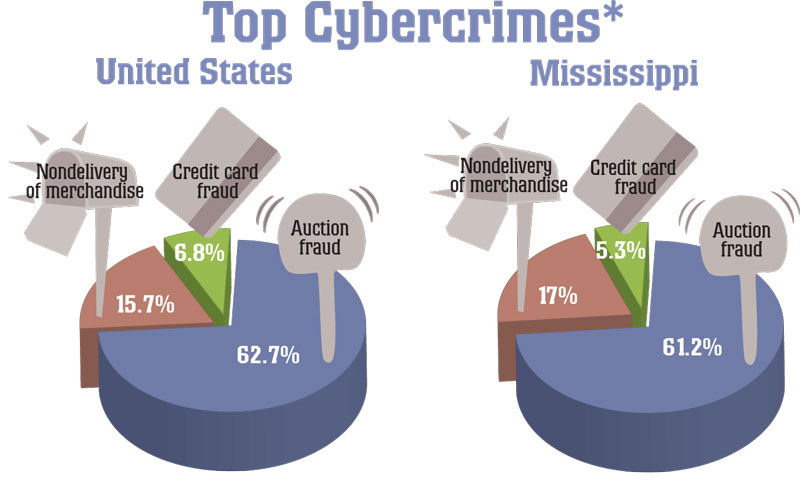UM legal center helps prosecutors nail criminals when computers are their
Weapons of Choice
by Jennifer Farish
“C
ybercrime” has not always been a familiar term in America.
But over the past five years, phrases such as “Internet predators” and “identity theft” have crept into the national lexicon and popular culture. Television crime shows depict children seduced online. Bank commercials show elderly citizens whose savings have been wiped out by identity thieves, and public service announcements remind parents that the Internet has become a virtual playground for pedophiles.
‘There are so many ways perpetrators can victimize people. They are clever, too.’
Richard Hamp,
Utah Assistant Attorney General
Real-life stories have emerged, too.
Since 2000, the number of crimes reported to the federal Internet Crime Complaint Center has risen from less than 30,000 a year to nearly 250,000 annually. In April, Federal Bureau of Investigation agents arrested more than 53 members of an international Internet piracy group and charged them with illegally distributing copyrighted movies, software, games and music online. Over the past year in Mississippi, the cybercrime unit in the state Attorney General’s Office has helped local law enforcement apprehend a number of people charged with exploiting children, including a Rankin County man facing 10 counts of child pornography, Attorney General Jim Hood says.
As Internet use increases—an estimated 68 percent of Americans has access to the Internet—law enforcement agencies and prosecutors are facing the challenges of working under the constraint of limited resources while trying to keep up with criminals who can adapt their tactics. To help those agencies and prosecutor offices combat the growing problem, a national center at UM is developing into a resource for cybercrime information and training.
Thomas Clancy, director of the National Center for Justice and the Rule of Law, says when the NCJRL Cybercrime Initiative was established in 2001, Internet crime was just being identified as a long-term problem.
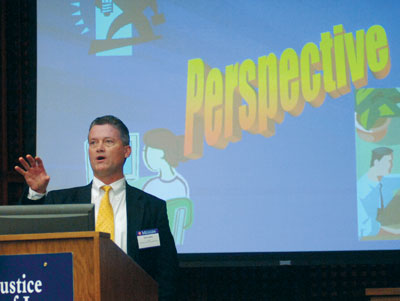
Kevin Bain
Dan Larkin, chief of FBI Internet Crime Complaint Center, delivers the keynote address at a National Association of Attorneys General conference held at the UM law school Nov. 1-3, 2005. The conference, hosted by the National Center for Justice and the Rule of the Law, focused on ‘Computer-Facilitated Identity Theft Training.’
Having spent a good portion of his career with the Attorney General’s Office in Maryland, Clancy knew education and resources for fighting Internet crime were lacking, particularly for statewide prosecutors. Working with the National Association of Attorneys General,Clancy found some training opportunities for state prosecutors but not in the area of investigating sophisticated crimes.
“There was a critical need out there, and it was an unfulfilled need,” he says. “Local prosecutors have an organization in South Carolina and a large organization in suburban D.C. that they can call on. Federal prosecutors have all the resources of the federal government, but there was this group of state prosecutors that, outside of NAAG, had very little resources.”
NAAG representative Hedda Litwin echoed Clancy’s statement, explaining that investigating computer-related crimes is difficult for state agencies that are already strapped for cash and manpower.
States need to coordinate their efforts to develop model approaches to investigate and prosecute sophisticated crimes, she says. “Unfortunately, the vast majority of states have not had access to the intensive technical training necessary to equip them with the tools and knowledge to begin handling these cases. Staggering caseloads and minimal training budgets have curtailed their ability to be away from the office to participate in lengthy educational programs.”
Because of these constraints, NAAG and NCJRL are working together to offer three training conferences, online information, CDROMs, special publications and just about anything else that will reach people who need information about Internet crimes. Just developing the materials is challenging because there are no programs to emulate. In fact, each training conference or material comes out of an advisory group formed by the partnership. The group identifies important issues or trends and then finds a way to distribute information on the subject. The center and its programs are funded through a federal grant from the U.S. Department of Justice.
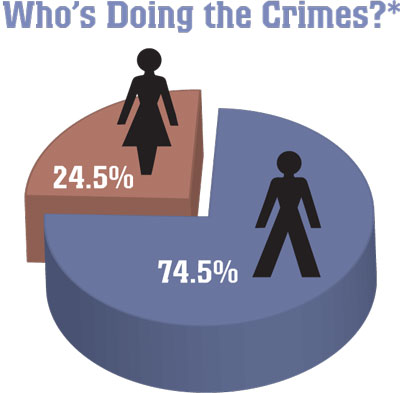
* in 2005
Half of these perpetrators resided in one of the following states: California, New York, Florida, Texas, Illinois, Pennsylvania and Ohio.
“We put together three training conferences a year, each on a different topic,” Clancy says. “Every year or so, we will repeat a basic conference for new attorneys general, which is a 21/2-day overview of cybercrime. All of the other conferences address current topics where we have identified that there is a critical need for education.”
Utah Assistant Attorney General Richard Hamp says the conferences are well-packaged and encourage attorney general offices to participate and share information. In fact, being able to compare stories with other states is a great side benefit of the NCJRL/NAAG training.
“I got a call from another attorney general not long ago who wanted to know about a program our state has set up called IRIS, which is an identity-theft program,” Hamp says.
In addition, he says prosecutors get cutting-edge information about technology that seems to change from day to day. “There are so many ways perpetrators can victimize people. They are clever, too. That’s why it is so great to have the type of dialogue that the conferences provide.”
In Mississippi, Hood says his cybercrime unit would not exist without the support it gets from the NCJRL/NAAG partnership.
“The cooperation and training has been exemplary,” he says. “Without the support of The University of Mississippi, the cybercrime unit at the Attorney General’s Office would not be possible.”
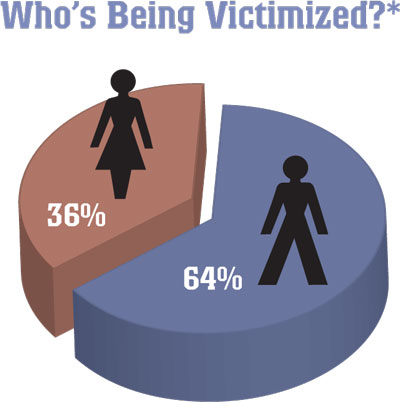
* in 2005
Half of these victims are between the ages of 30 and 50
In fact, because of the partnership, the cybercrime unit will be moving into a new facility in the Sillers Building. The move will give investigators access to a state-of-the art laboratory and will allow for daily interaction among the attorney general’s investigators, forensic analysts and prosecutors with their counterparts in the FBI, the Secret Service, the U.S. Attorney’s Office, Southern District of Mississippi, the U.S. Postal Service and local law enforcement, Hood says.
“The NCJRL and NAAG will join with Mississippi State University in continuing the relationship to train prosecutors, judges and law enforcement. Because of the university’s support, training will expand to meet Mississippi’s goal of excellent cybercrime law enforcement and the education of prosecutors,” he says.
The initial funding for the state cybercrime unit was from a grant through NCJRL and NAAG, and the unit is featured by NAAG as a model cybercrime unit. A grant through UM pays for an intern at the state office as well.
Hood says both prosecutors’ offices and the NCJRL/NAAG benefit from the programs that are being established.
“NAAG and NCJRL benefit from hearing the practical problems that prosecutors encounter in areas such as pretrial discovery, the presentation of scientific evidence, expert testimony, commonly raised defenses, and the education of the judge and jury [about] a crime that has computer evidence,” he says. “With this information, NAAG and NCJRL can tailor their conferences to fit the prosecutors’ needs. Prosecutors in turn benefit from expertise on a national level and the personal interaction with other prosecutors.”
But that’s not all that is being done. A concerted effort is under way to find new ways to continue developing the NCJRL as a resource. A Web site has been set up containing information on various aspects of cybercrime, including an online primer on search and seizure of computers written by Clancy.
Developing materials to train law enforcement officials is challenging because there are no programs to emulate
In April, NCJRL and NAAG hosted a conference on Internet victims, and a special edition of the Mississippi Law Journal published this fall carried articles stemming from the conference. The center also puts together a regular Cybercrime Newsletter, which is available in print and on the NCJRL Web site.
Also available are materials on legally accessing the computers of people on probation and a free CDROM on predators who use chat rooms to exploit children. The CDROM, which was recognized by the Center for Digital Government in California with the Best Sustainable Value award of 2005, explains how to investigate and prosecute such cases. Copies can be obtained by law enforcement and prosecutors’ offices at no charge by contacting the NCJRL, and Clancy says more than 100,000 copies already have been distributed.
“There will be more materials coming to the Web site soon, and, at some point, we want to offer interactive materials and distance-learning opportunities,” Clancy says. “We’re not there yet, but that is part of this effort not only to provide the conferences and training but also to be a source of continuing education and information.”
Cochran recognized for cybercrime funding
U.S. Sen. Thad Cochran has been honored by the National Association of Attorneys General for providing funding for the National Center for Justice and the Rule of Law at UM.
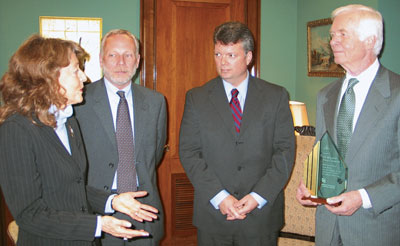
Presenting a plaque to U.S. Sen. Thad Cochran (right) for securing funding for cybercrimes training and prosecution are Lynne Ross (left), executive director of the National Association of Attorneys General; Tom Clancy, director of the National Center for Justice and the Rule of Law at the UM School of Law; and Jim Hood, Mississippi’s attorney general.
Recognizing Cochran’s role in fighting cybercrime by funding the education of prosecutors nationwide and Mississippi law enforcement officials, association representatives recently presented the senator with a plaque in Washington, D.C.
Mississippi Attorney General Jim Hood said his office’s Cybercrime Center has greatly benefited from training and funding that resulted from Sen. Cochran’s efforts.
“An example of how Senator Cochran’s work has paid off for Mississippi is last [December’s] arrest of Mark Daniel Schear in Rankin County on 10 counts of child pornography,” Hood said. “Just this [past] year the cybercrime unit in our office has helped local law enforcement agencies protect our children by securing the indictments of John Argo IV on possession of child pornography in DeSoto County, Derrick Walker on possession of child pornography in Rankin County, Joel Hartfield on possession of child pornography in Newton County, Kenneth Hearon on transmission and possession of child pornography in Warren County and Chris Bolton on child exploitation via a computer in Hinds County.”
 Presenting a plaque to U.S. Sen. Thad Cochran (right) for securing funding for cybercrimes training and prosecution are Lynne Ross (left), executive director of the National Association of Attorneys General; Tom Clancy, director of the National Center for Justice and the Rule of Law at the UM School of Law; and Jim Hood, Mississippi’s attorney general.
Presenting a plaque to U.S. Sen. Thad Cochran (right) for securing funding for cybercrimes training and prosecution are Lynne Ross (left), executive director of the National Association of Attorneys General; Tom Clancy, director of the National Center for Justice and the Rule of Law at the UM School of Law; and Jim Hood, Mississippi’s attorney general.




